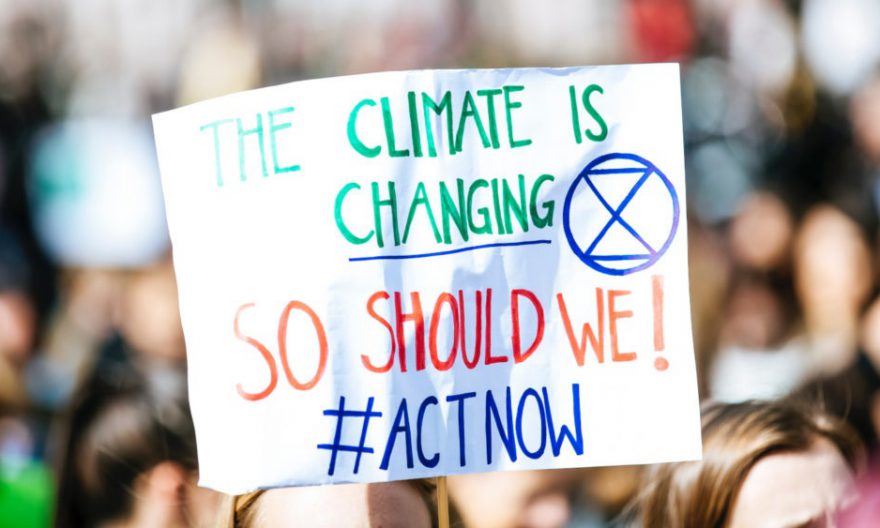
In a bid to revamp their active participation in climate change, The African Youth Initiative on Climate Action (AYICC) is preparing “The Green Book Project.” The Green Book Project, aims to provide a unique data base showcasing eco-friendly, climate-smart and resilient projects by the youth across Africa.
The African Youth Initiative on Climate Change (AYICC) during its 2021 conference on climate change discussed on various issues related to climate change and the youth engagement on climate actions. Especially, the conference underscored the recent IPCC’s climate change report indicated Africa’s recent changes in the climate as “widespread, rapid, and intensifying and unprecedented in thousands of years.”
The youth argued that the IPCC’s recommendations that “the climate we experience in the future depends on our decisions and actions” directly is relying on the responsibility and strong actions of the youth generation to limit the warming to 1.5 degree Celsius in their position paper during the final day of the three day annual conference of the 2021 African Youth Conference on Climate Change (AfriYOCCC 2021).
Presenting a paper during the conference, International Panel on Climate Change (IPCC) vice chair, Professor Youba Sokona said that Africa is experiencing extreme heat, heavy rainfall, frequent drought, fire weather and ocean acidifying due to the impacts of climate change. He argued that, these needs strong and collective actions to save the future of the continent by combating the current climate change problems.
In this regard, Prof. Youba argued, the role of the youth in the continent is very crucial as Africa is dominated by young people.
Citing the IPCC report, Prof. Youba stated that most parts of Africa have warmed by more than 1.5 degree Celsius and Africa shares 3.8 per cent of global carbon dioxide emissions. He added that the continent’s vulnerability to climate change is rapidly increasing. Africa as a whole is a climate change hot spot continent, he added.
According to him, Africa needs transformation in climate action and the youth is the key actor for both adaptation and mitigation climate actions calling the youth to boost their participation in climate change actions to control the climate related impacts in the continent.
Chiagozie Udeh, a youth, during the event stated that the role of the African youth is key to address climate change adding the youth engagement in national climate change policies and follow their implementations would help the facilitating the actions against climate change.
For him, without strong engagement and participation of the continent’s youth, it is impossible to halt the current and continued effects that the continent is experiencing driven from climate change.
A Youth Climate Champion from Africa, Olumide Idowue stated that climate change has increased its levels of uncertainty about the future world adding the world is waiting strong participation and actions from the youth generation. He noted that Africa also needs much more actions and engagements from the young people as the majority of the continent’s population youth.
“Africa’s population is young and continues to get young,” Olumide stated adding “this can present an opportunity for young people to elevate the continent in all fields, including the battle against climate change.” Hence, it is necessary to mobilize this huge human resource of the continent to tackle the continent’s common problem especially by supporting the participation of the youth generation in sustainable solutions and investments in ecological projects.
Though the participation of the young generation in climate action is increasing from year to year in the continent, so far, the involvement and engagement of the youth generation in battling climate change and participating in decision making related to the climate action is undeveloped.
Hence, during the conference, the panelists and environment activists in the continent argued that promoting and supporting the youth generation’s engagement is critical to boost the continent’s actions on climate change. Similarly, the youth generation also faced challenges during fighting against climate change.
Meanwhile Olumide stated that “in tackling the solutions in Africa, youth often face limitations such as access to finance, land, credit, training and new technologies needed to effectively improve livelihoods.”
The major objectives of the green book are to promote selected youth-led ecological smart projects and initiatives, to encourage governments and partners to support the selected projects in the continent advocate for more support to ensure youth engagement in climate action projects and sustainable development in the continent, he added. According to him, this would help to exploit the youth capacity by providing necessary supports to new environmentally friendly initiatives and innovations by the youth’s of the continent.
According to him, the youth are the key actors of the strategy and the implementations in climate change, both the adaptation and mitigation measures. Hence, driving the capacity of the youth on both measures by capitalizing their initial activities would strengthen their efforts in the sector. The Youth Eco-Smart Green Book is promoting Youth-led ecological smart projects and initiatives across Africa mainly the climate promoted investments, the agriculture, recycling and renewable energy investments.
Following the completion of the three day AfriYOCCC 2021 virtual conference, the African youth launched African Youth Position Paper on Climate change to be submitted to the COP26, to the African Union and other regional and continental organizations engaged in climate action.
Presented the African Youth Paper Position on Climate Change prepared by AYICC, Elizabeth Gulugulu, a young women from Zimbabwe said that the position paper targets to increase the participation of the continent’s youth in climate action, to inform decision makers to include youth generation in climate related decisions, to aware leaders for the seriousness of the problem in the continent and other related issues that the continent is needed to act continentally and at international forums.
According to her, AYICC has over networks with over 42 national associations on climate change and the position paper was the voice of these entire networks to reflect African problems and challenges. The position paper underlines that young people are underrepresented and the position paper underlines the need for strong participation and representation of the young generation in climate policies and implementations.
In addition, the African Youth Position paper underscored that all strategies and plans should be within 1.5 degree Celsius. The youth’s involvement and participation would help for the follow-up of the implementation of this serious global issue.
Meaningful participation of the youth in national, regional, continental and international conferences as decision makers, access to climate finance for the young people, disseminating timely information about climate change, the need for the involvement of on the implementation of National Determined Contributions (NDCs) and capacitating the young people on the four climate friendly sectors are among the key issues that the AYICC indicated in their position paper.
According to the position of the youth, this would help to attract more youth engagement on climate resilient economic activities, increase job opportunities and even for the sustainability of jobs. In addition, it promotes new innovations that would help the actions on climate change.
Executive Coordinator of the African Youth Initiative on Climate Change (AYICC), Kassim Gawusu-Toure during the opening session of the conference argued that Africa is seriously affected by climate changes and the youth generation is the top victim of the problem.
Though, the youth generation is affecting by the climate change and has the capacity to tackle it, the youth are behind all major decisions in the sector. Hence, the youth should fight to involve in decision makings and should actively engage in tackling the climate problem by increasing its actions.
BY DARGIE KAHSAY
ETHIOPIAN HERALD 17 SEPTEMBER 2021





